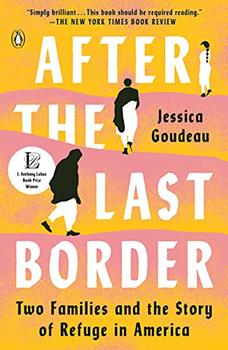Summary | Excerpt | Reading Guide | Reviews | Beyond the Book | Readalikes | Genres & Themes | Author Bio

Critics' Opinion:
Readers' Opinion:
First Published:
Aug 2020, 368 pages
Paperback:
Aug 2021, 368 pages
 Book Reviewed by:
Book Reviewed by:
Jamie Chornoby
Buy This Book
Chapter 1
Mu Naw
Austin, Texas, USA, April 2007
Mu Naw stood on the landing above the airport baggage claim-area at Austin-Bergstrom International Airport and wished she had on different shoes. She shifted the plastic International Organization for Migration bag from her left shoulder to her right and grabbed her daughter's hand. There were two escalators leading down; she and her husband, Saw Ku, had instinctively paused, not sure which one to take. People passed them on the right and left, confidently moving through space as Mu Naw never had. Mu Naw's shoes, the black rubber slide-on sandals everyone used in Mae La camp, felt dusty, undignified. She was proud of her skirt and shirt-these were her nicest clothes. They were red and handwoven in the traditional Karen style, a long straight skirt with braided fringes brushing the top of her feet, a tunic with a diamond-shaped hole she slipped her head into. She looked at her daughter Naw Wah, who was two, in her pink Karen dress, and her other daughter, Pah Poe, who was five, in a turquoise one. Even Saw Ku, holding Pah Poe's hand, had a green tunic that he wore with jeans. In the tiny airplane bathroom, Mu Naw had rebraided the girls' hair, and Saw Ku had slicked his hair down with water from the tinny sink.
She had heard from friends at the camp that she would get a black sweater and new shoes on the bus to Bangkok. There had been no shoes and no sweaters, though Mu Naw had looked behind the bus seats to make sure. She was too shy to ask the UN workers at the time, but she had not stopped worrying about her rubber sandals in every airport, afraid they seemed shameful to the IOM worker guiding them, that the lack of new shoes meant that she had missed some important step everyone else knew that she did not.
Now the IOM worker was gone. That was another piece of information they had heard in the camp, this one accurate: They would know they were boarding their last flight because the IOM worker would not go with them. Mu Naw had barely known the woman, but now felt bereft without her.
That woman had been certain and knowledgeable, guiding them through their travels by reading the long lists of names on huge signs overhead in each airport and then translating them into their native dialect, Karen, from Bangkok to Los Angeles. Mu Naw could read several things in English already, but she could not understand why the large A22 meant you were on a flight to Dubai, and A23 meant you were going to Hong Kong, but A24 meant Los Angeles. It was one of thousands of things Mu Naw did not grasp.
Mu Naw's entire life had been spent with people who looked like her. Occasionally, a white UN worker or volunteer came to the camp, but that was it. Everywhere she turned were people with different eyes, ears, hair, noses, clothes, skin, mouths, purses, hats, hijabs, necklaces, bracelets, wallets, suitcases, books, food, water bottles, headphones, scarves, pillows, sweaters, shoes. Even when her eyes were down to shield her from the onslaught of strange sights, the languages assaulted her ears, snatches in tones she had never heard, musical, guttural, loving, rude. The smells of perfume, food, sweat, air-conditioning kept her from breathing in deeply.
Now, in Austin, standing in her last airport at the top of two escalators going down, she wished desperately for one brief minute that they were back in Mae La camp. She wished the IOM woman were still with them. She wished she had her new sweater and shoes.
They had only seen an escalator a handful of times, most of them in airports within the last twenty-four hours. She turned and gazed blankly at her husband for a minute. Saw Ku walked to the escalator on the left, almost running into a white businessman pulling a suitcase behind him. Mu Naw fell into place behind him. She stumbled for a minute, eyes down to keep her balance, clutching the rail that made her hand move slightly faster than the stairs on which she stood. She made sure Naw Wah's tiny feet were centered in the metal striped step. When she finally reached the bottom of the stairs, anxiously avoiding the steps submerging into each other, Mu Naw took a firm step with Naw Wah over the line that ended the escalator, then looked up. She didn't have time to worry; a man was already greeting them in Karen, standing beside a tall white woman with a wide smile.
Excerpted from After the Last Border by Jessica Goudeau. Copyright © 2020 by Jessica Goudeau. All rights reserved. No part of this excerpt may be reproduced or reprinted without permission in writing from the publisher.





The Flower Sisters
by Michelle Collins Anderson
From the new Fannie Flagg of the Ozarks, a richly-woven story of family, forgiveness, and reinvention.

The House on Biscayne Bay
by Chanel Cleeton
As death stalks a gothic mansion in Miami, the lives of two women intertwine as the past and present collide.

The Funeral Cryer by Wenyan Lu
Debut novelist Wenyan Lu brings us this witty yet profound story about one woman's midlife reawakening in contemporary rural China.
Your guide toexceptional books
BookBrowse seeks out and recommends the best in contemporary fiction and nonfiction—books that not only engage and entertain but also deepen our understanding of ourselves and the world around us.